Crescent Sustainability Initiatives
Partnerships for the Goals (SDG 17)
DEDICATION TO SUSTAINABLE DEVELOPMENT THROUGH NGO PARTNERSHIPS
The B.S. Abdur Rahman Crescent Institute of Science and Technology (BSACIST) is dedicated to promoting sustainable development through robust partnerships with non-governmental organizations (NGOs). By collaborating with organisations like the Institution of Green Engineers (IGEN), BSACIST aims to advance clean energy solutions and energy-efficient technologies that benefit the institution and support the wider community in transitioning to renewable energy sources. This partnership is vital to BSACIST’s commitment to achieving the Sustainable Development Goals (SDGs), particularly SDG 7, which focuses on ensuring access to affordable, reliable, sustainable, and modern energy for all.
ENGAGING STUDENTS THROUGH VOLUNTEERING PROGRAMS
One primary avenue for collaboration is through student volunteering programs that engage students in meaningful community service. These programs allow students to participate in initiatives that promote clean energy awareness and sustainable practices. For instance, BSACIST students actively participated in the IGEN ENERGATHON 2023, where they volunteered in various capacities, demonstrating their commitment to sustainability and earning recognition for their contributions. Such experiences enhance students’ understanding of environmental issues and empower them to take action in their communities.
COLLABORATIVE RESEARCH FOR SUSTAINABLE SOLUTIONS
In addition to volunteering, BSACIST collaborates with NGOs on research programs that focus on innovative solutions for clean energy and sustainability. The IGEN ENERGATHON 2023 Conference served as a platform for experts, researchers, and students to share insights and discuss advancements in sustainable energy. BSACIST’s faculty and students presented their research and best practices, showcasing their dedication to the SDGs and contributing to the global dialogue on sustainable energy solutions. This collaborative research enriches the academic environment and provides practical solutions to real-world challenges.
EDUCATIONAL RESOURCE DEVELOPMENT TO PROMOTE AWARENESS
Furthermore, developing educational resources is crucial to BSACIST’s collaboration with NGOs. By creating educational materials and hosting workshops, the institution aims to raise awareness about the importance of sustainability and the role of clean energy in achieving the SDGs. The involvement of faculty members in the IGEN ENERGATHON, where they received multiple awards for their contributions, highlights the institute’s commitment to fostering a culture of sustainability through education and community engagement.
A HOLISTIC APPROACH TO ACHIEVING THE SDGS
In conclusion, BSACIST’s collaboration with NGOs like IGEN exemplifies a holistic approach to tackling the SDGs through student engagement, research, and education. By integrating these efforts, BSACIST contributes to global sustainability initiatives and prepares its students to become informed and responsible leaders in the field of clean energy. This partnership enhances the institute’s educational offerings and strengthens its role as a catalyst for positive change within the community and beyond. Through these collaborative initiatives, BSACIST is paving the way for a sustainable future, demonstrating the power of partnerships in achieving the SDGs.
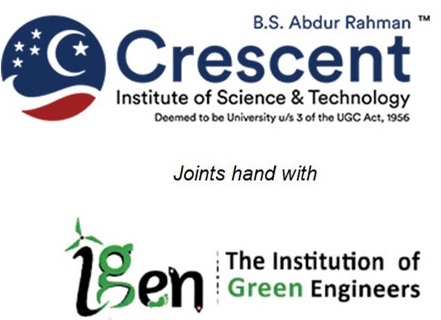
The Faculty members of BSACIST are encouraged to inform and support Government and NGOs in Clean Energy and Energy – Efficient technology to help the community to return to renewable energy sources and to reduce environmental impacts. In line with that, BSACIST joints hand with IGEN – The Institution of Green Engineers (IGEN) to connects green professionals worldwide, working towards SDG goals and providing solutions for a sustainable greener future through the 9 colour nonagon VIBBGGYOR society.
IGEN – Serve as a catalyst to connect all professionals for building a greener world.
To bring together all the professional practitioners working for creating a green community. To provide sustainable environmental solutions to achieve a green world. To inspire, inform and influence the global engineering community to adopt green engineering practices in their design, product, process and systems. https://www.theigen.org/
REPORT ON IGEN ENERGATHON 2023 – SETTING A NEW WORLD RECORD AND ACHIEVEMENTS
INTRODUCTION
This report provides an overview of the successful IGEN ENERGATHON 2023 Conference, a prestigious event in the field of energy and sustainability. The conference, focused on clean and sustainable energy solutions, brought together experts, researchers, industry leaders, and students to engage in discussions and explore various aspects of affordable and clean energy. This report highlights the conference’s accomplishments, including the awards received by B.S. Abdur Rahman Crescent Institute of Science and Technology and the notable contributions of individuals from our institution.
CONFERENCE DETAILS
The IGEN ENERGATHON 2023 Conference, held in Indian Standard Time (IST), featured an exciting schedule of sessions and activities. The event served as a platform for meaningful discussions, collaborations, and the exchange of valuable insights in the field of clean and renewable energy. Marathon started at 06:45 AM on 27th May 2023 and ended at 01:30 AM 28th May 2023.
The YouTube videos with 18 sessions are available in the following links.
Part I @ https://www.youtube.com/watch?v=f6r8WPrfup8&t=7s
Part 2 @ https://www.youtube.com/watch?v=Q7EFgOsSh8s&t=2s
ACHIEVEMENTS
B.S. Abdur Rahman Crescent Institute of Science and Technology received the following awards at the IGEN ENERGATHON 2023 Conference:
IGEN SUSTAINABILITY BEST PRACTICE AWARD
This award recognizes our institution’s successful demonstration of best practices, policies, and a strong commitment to attaining SDG 7 and its related UN Sustainability Goals. The Best Practices adopted by our institution were presented during the 19.13-hour marathon conference, showcasing our dedication to sustainable energy solutions.
https://bsacist.crescent.education/wp-content/uploads/2023/11/5.-IGEN-Energathon-Certificate.pdf
IGEN STAR CONTRIBUTOR
Our institution’s speakers participated in the “UNITED NATION GLOBAL REPORTS PRESENTATION” session, contributing to the representation of #SDG7 during the conference. This award acknowledges their valuable contributions to the discussions on clean and affordable energy.
https://bsacist.crescent.education/wp-content/uploads/2023/11/6.-IGEN-Star-Contributor.pdf
IGEN ENERGATHON STAR AMBASSADOR CERTIFICATION
Our institution’s active participation resulted in more than 100 participants representing our institution, earning us the IGEN ENERGATHON STAR AMBASSADOR CERTIFICATION. This certification recognizes our commitment and enthusiasm for promoting sustainable energy solutions.
INDIVIDUAL CONTRIBUTIONS
Several individuals from our institution made noteworthy contributions to the IGEN ENERGATHON 2023 Conference:
Dr. R. Jayashree, Professor and Head of the Department of Electrical and Electronics Engineering, received the IGEN Ambassador Award for her notable contributions.
Dr. S. Jennathu Beevi, AP(Sel.Gr)/EEE Energy Club Coordinator of BSACIST, participated as a speaker in the “Organizer Institution – Global Energy Reports Presentation” session and the “SDG7 Action / Best Practices Presentation” session. Dr. S. Jennathu Beevi received the Speaker Award for both sessions.
Dr. R. Zahira, AP(Sr.Gr) , played a vital role as the overall Organizing Head and Committee Member of the IGEN ENERGATHON 2023 Conference. Dr. R. Zahira’s significant contributions led to the successful celebration of the conference in alignment with the United Nations SDG7. Furthermore, her efforts in creating a new world record for the Non-Stop, online Conference on SDG7 Affordable and Clean Energy towards Sustainability were recognized with the Star Organizer and Contributor Awards. https://www.linkedin.com/in/drrzahira/
Dr. S. Suresh, AP(Sel.Gr)/EEE, organized one of the sessions at the IGEN ENERGATHON 2023 Conference and received the Organizer Award for his valuable efforts.
Dr. K.R. Shanmuga Vadivu, Assistant Professor, received the IGEN Ambassador Award.
CONCLUSION:
The IGEN ENERGATHON 2023 Conference served as a platform for knowledge sharing, collaboration, and promoting sustainable energy solutions. B.S. Abdur Rahman Crescent Institute of Science and Technology’s notable achievements and contributions to the conference were acknowledged through multiple awards and certifications.
Mr. Shoaib, Ms. Ayesha Sithika from the second year of the Electrical and Electronics Engineering (EEE) department, along with Vikram Venkat from the final year of the EEE department, actively volunteered for the event and were honored with the IGEN Volunteer Certificate.
Furthermore, over 100 students from our institute enthusiastically participated in this historic world record event and were awarded certificates of participation, recognizing their valuable contribution.
The valedictory function of the IGEN ENERGATHON 2023 winners can be accessed through the link provided below.
https://www.youtube.com/watch?v=HtgD73L24n0&t=5584s
Dr. Karthikeyan Ramalingam, Professor, Dean (Student Affairs) & Chief Proctor gave a acceptance speech in the valedictory function conducted on June 27th, 2023 via Zoom.
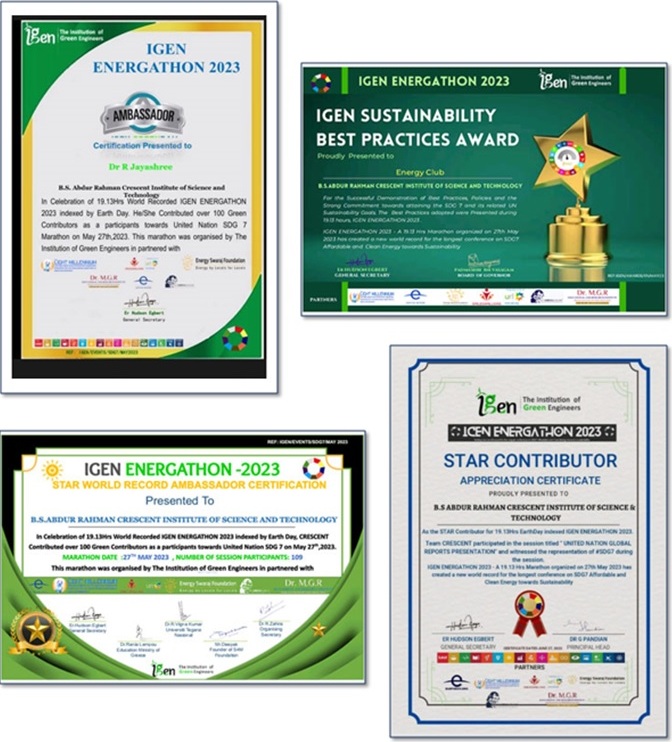
Figure XVII (2.5) – 1 : Awards and Appreciation Certificates received in IGEN Energathon 2023
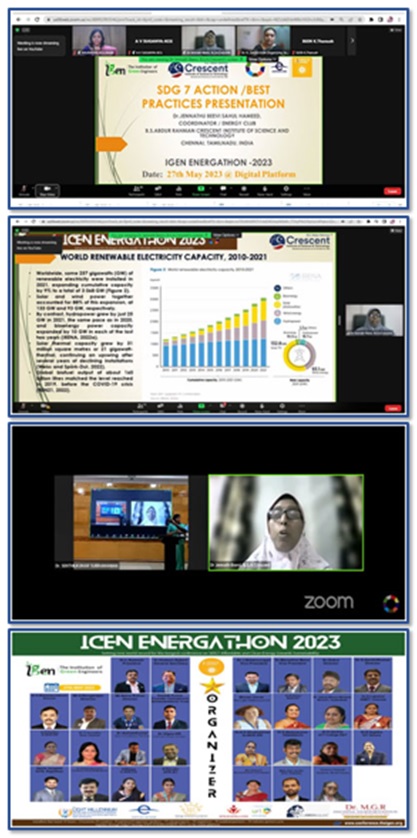
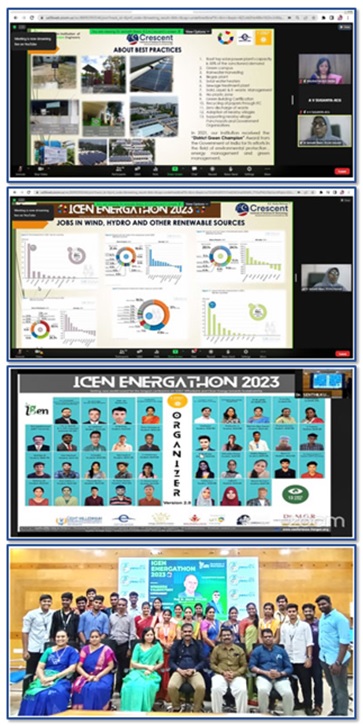
Figure XVII (2.5) – 2 : Screenshots showing the participation of members of Crescent Energy Club in IGEN Energathon 2023
COLLABORATION WITH B.S. ABDUR RAHMAN CRESCENT ALUMNI ASSOCIATION TO ACHIEVE SUSTAINABLE DEVELOPMENT GOAL (SDG)
The B.S. Abdur Rahman Crescent Alumni Association serves as a vital platform for strengthening the connection between alumni and their alma mater while emphasising a collaborative approach to addressing the Sustainable Development Goals (SDGs). Through various initiatives, the association actively engages alumni in student volunteering programs, fostering a sense of community and shared responsibility for sustainable practices and social impact.
ALUMNI LIFE ENGAGEMENT
A key feature of the “Alumni Life” section encourages alumni to participate actively in community initiatives. This includes opportunities to sign up for various volunteering activities, engage in campus visits, and make zakat donations that support sustainable development projects. Linking alumni to the university’s mission and SDG initiatives facilitates meaningful contributions to addressing local and global challenges.
RECOGNIZING ACHIEVEMENTS
The Alumni Association highlights a dedicated section for “Award Winners” from 2022, celebrating notable alumni who have significantly contributed to advancing the SDGs. Recognising these achievements honours individual efforts and inspires others within the alumni community to pursue impactful paths in sustainability and social responsibility, thus encouraging broader participation in SDG-related initiatives.
PROMOTING HANGOUT EVENTS
Additionally, the association promotes alumni hangout events designed to foster networking and collaboration among members. These gatherings allow alumni to share innovative ideas, initiate research programs, and develop educational resources that align with the SDGs. By offering details about upcoming events and facilitating engagement within the alumni network, the association helps build partnerships that drive sustainable initiatives and collective action.
SUMMARY
Overall, the B.S. Abdur Rahman Crescent Alumni Association transcends being merely a connection hub; it plays a crucial role in mobilising alumni efforts towards sustainable development. The association supports a collaborative approach to tackling the SDGs by integrating volunteerism, recognition, and community engagement. This empowers alumni to contribute positively to society and the environment, enriching the alumni experience while strengthening the university’s position as a catalyst for sustainable change.
The alumni association organises diverse educational student volunteering programs and educational resource development.
A. SCHOLARSHIPS FOR ECONOMICALLY WEAKER STUDENTS
One of the key initiatives BSACIST has undertaken to support economically weaker students is the BSA Crescent Alumni Zakat Scholarship program. This program is designed to assist needy college students in Tamil Nadu by providing financial support to help them pursue their education. The scholarship program aligns with the mission of alleviating poverty and empowering individuals through education.
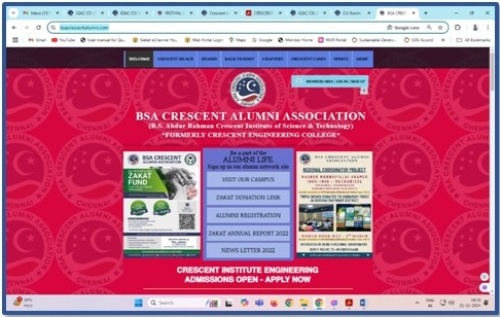
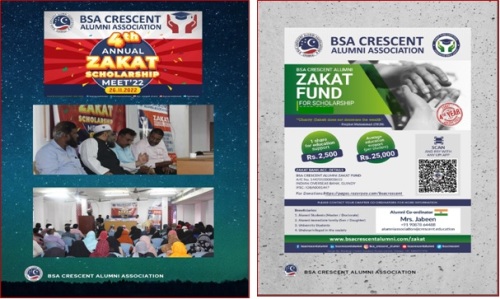
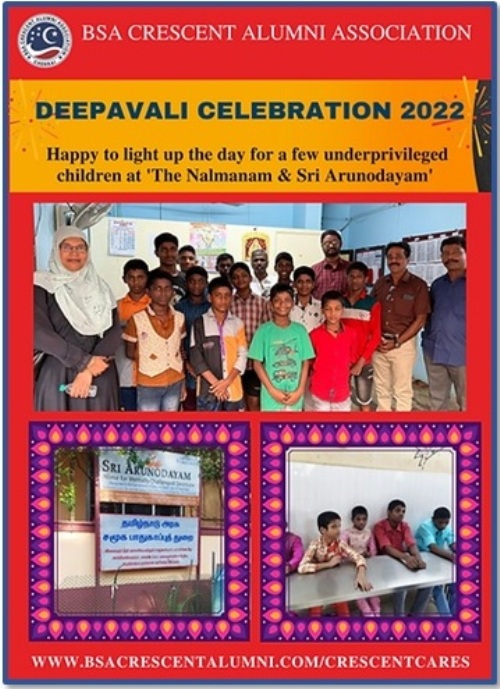
Figure XVII (2.5) – 3 : BSA Crescent Alumni Association
ANNUAL REPORT FOR THE YEAR 2022-23
In the year 2022, the BSA Crescent Alumni Association distributed a total of ₹14,98,977/- (Rupees Fourteen Lakhs Ninety-Eight Thousand Nine Hundred and Seventy-Seven only) in scholarships, benefiting 140 students. This financial assistance plays a crucial role in enabling students from low-income families to access higher education, thereby breaking the cycle of poverty. The scholarship program addresses immediate financial needs and instils a sense of hope and dignity among recipients, empowering them to aspire for better futures.
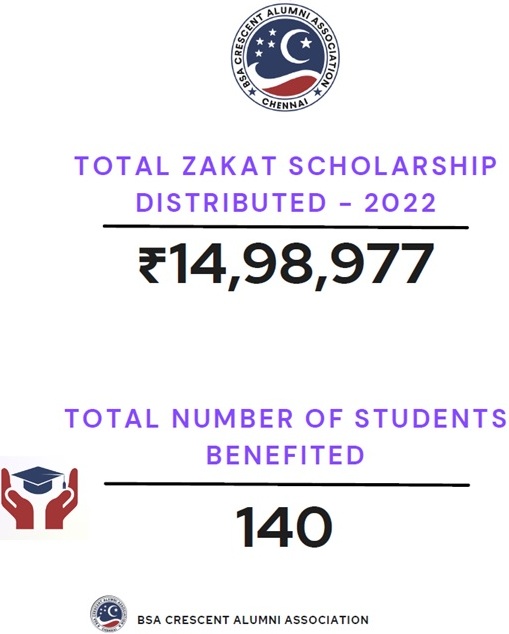
B. COMMUNITY ENGAGEMENT – BRIDGING THE DIGITAL DIVIDE FOR ENHANCED LEARNING OPPORTUNITIES
B.S. Abdur Rahman Crescent Institute of Science and Technology (BSACIST) has actively engaged in educational outreach activities beyond its campus, demonstrating a commitment to community development and the enhancement of local education. A notable initiative involved distributing computers to primary school children in the adopted villages of Padappai and Rattinamangalam on September 12, 2022.
The distribution of computers is a significant step in bridging the digital divide and enhancing learning opportunities for young students in these villages. By providing access to technology, BSACIST equips children with essential tools for their education and fosters an environment where they can develop digital literacy skills crucial for their future academic and professional endeavours.
This initiative reflects the university’s understanding of integrating technology into education, particularly in rural settings with limited resources.
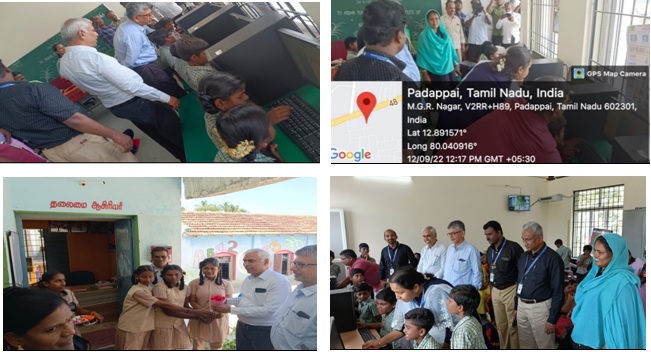
Figure XVII (2.5) – 4: Empowering Young Minds: BSACIST’s Educational Outreach Initiative in Padappai and Rattinamangalam – Distributing Computers and Enhancing Learning Opportunities for Local Schools
C. COMMUNITY ENGAGEMENT – ENHANCE OPPORTUNITIES FOR INDIVIDUALS IN THE PUBLIC SECTOR
The BSA Crescent Alumni Association’s recent initiative to donate TNPSC preparation books to the Abiramam Trust in the Ramanathapuram District exemplifies the commitment to Sustainable Development Goal 1: No Poverty. By providing essential educational resources to underserved communities, this project aims to enhance opportunities for individuals seeking employment in the public sector. Such endeavours empower individuals through education but also contribute to breaking the cycle of poverty by enabling access to stable job prospects. The initiative underscores the belief that education is a fundamental tool for social mobility and economic upliftment, aligning perfectly with the mission to foster equality and opportunity for all.
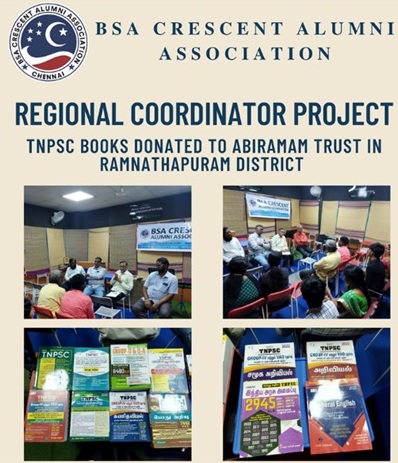
Figure XVII (2.5) – 5: Empowering Minds: Donation of TNPSC Preparation Books to Abiramam Trust in Ramanathapuram
B.S. Abdur Rahman Crescent Institute of Science and Technology is committed to supporting economically weaker students through scholarships and community engagement initiatives. The institute actively reduces poverty and promotes educational equity by aligning its policies with SDG 1 – No Poverty principles. Through programs like the BSA Crescent Alumni Zakat Scholarship and various outreach activities, BSACIST empowers individuals to pursue higher education, fostering a culture of lifelong learning and community development. As the institute continues to expand its initiatives, it remains dedicated to serving society and promoting knowledge for all, regardless of socio-economic status.
COLLABORATION FOR SUSTAINABLE DEVELOPMENT: ROTARACT CLUB INITIATIVES ALIGNED WITH THE SDGS
SDG 17: PARTNERSHIPS FOR THE GOALS – COMMITMENT TO COLLABORATION: ADVANCING THE SDGS
The Rotaract Club of Crescent has strongly committed to collaborating with NGOs to address the Sustainable Development Goals (SDGs) through various impactful initiatives during the 2022-23 academic year. These collaborations have enhanced student engagement and fostered a sense of social responsibility among members. By participating in community service projects, educational seminars, and awareness campaigns, the club has effectively contributed to the broader objectives of sustainable development.
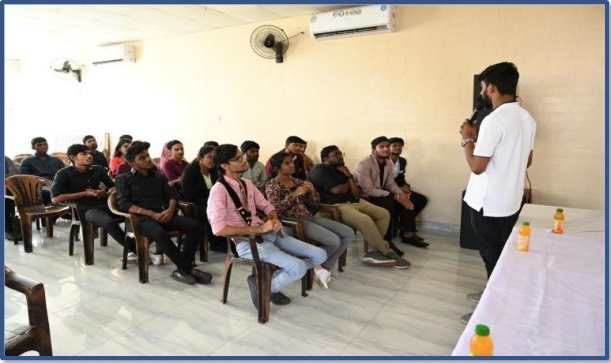
Figure XVII (2.5) – 6 : Rotaract Club of Crescent – Education Seminar
SDG 15: LIFE ON LAND – CARING FOR ANIMALS: THE “STAY FOR STRAYS” INITIATIVE
One of the notable collaborations was the “Stay for Strays” initiative, where Rotaract members volunteered at the Blue Cross of India. This three-day event focused on caring for animals in need, highlighting the importance of animal welfare as part of the SDGs. The active involvement of students in this initiative not only provided essential support to the shelter but also raised awareness about the significance of compassion towards animals, aligning with the goal of promoting sustainable communities.
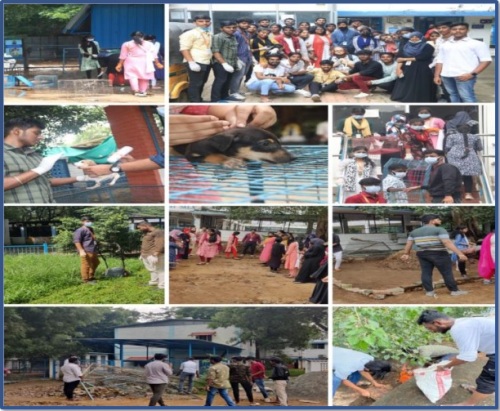
Figure XVII (2.5) – 7 : “Stay for Strays” initiative, where Rotaract members volunteered at the Blue Cross of India
The club’s green rotaractors came together for three consecutive days, dedicating their time and energy to volunteer and provide assistance to the animals at the shelter
SDG 4: QUALITY EDUCATION – SUPPORTING SPECIAL NEEDS: THE “THATPAM” PROJECT
Another impactful project was “Thatpam,” which took place at Hope Special School. This collaboration involved multiple Rotaract clubs and aimed to support children with special needs. The event included donations of toys and funds and a nourishing meal for the children. By engaging in such initiatives, the Rotaract Club addressed immediate needs and contributed to the long-term goal of ensuring inclusive and equitable quality education for all, as outlined in the SDGs.
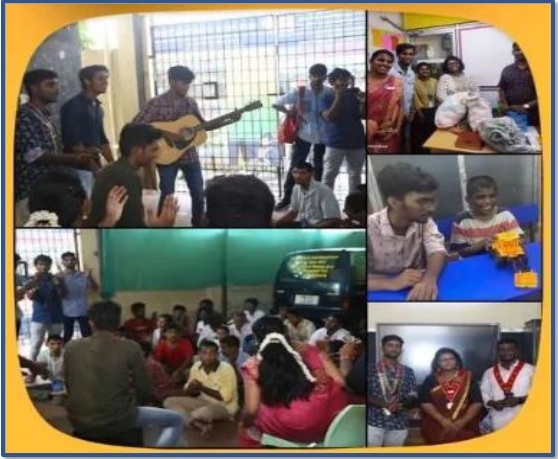
Figure XVII (2.5) – 8 : “Thatpam” Project to support children with special needs
A series of games were played, fostering a lively atmosphere that brought joy to both the special children and the dedicated rotaractors.
SDG 3: GOOD HEALTH AND WELL-BEING – ENHANCING ELDER CARE: THE “VAAGAI” INITIATIVE
The “Vaagai” project, which focused on community service at an old age home, further exemplified the club’s dedication to social welfare. By organising interactive activities and providing companionship to the elderly, the Rotaract Club addressed this demographic’s social isolation. This initiative aligns with the SDG of promoting healthy lives and well-being for all ages, demonstrating the club’s commitment to fostering inclusive communities.
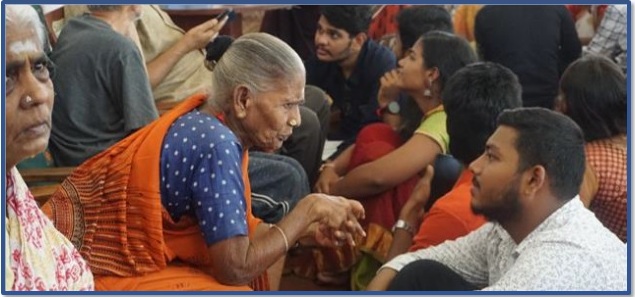
Figure XVII (2.5) – 9 : Enhancing Elder Care: The “Vaagai” Initiative
SDG 4: QUALITY EDUCATION – PROMOTING CYBER SAFETY: THE “CYBER SECURITY AWARENESS” PROJECT
In addition to direct community service, the Rotaract Club has also prioritised educational initiatives. The “Cyber Security Awareness” project involved collaboration with various NGOs to educate participants about the risks associated with social media and cyberspace. By inviting experts to share their knowledge, the club empowered students to navigate the digital landscape safely, contributing to the SDG of ensuring inclusive and equitable education.
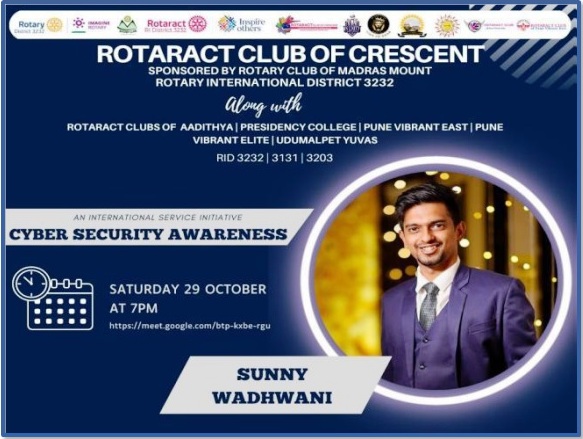
Figure XVII (2.5) – 10 : The “Cyber Security Awareness” Project
SDG 3: GOOD HEALTH AND WELL-BEING – ADVOCATING MENTAL HEALTH: THE “MENDING MINDS” EVENT
The “Mending Minds” event showcased the club’s commitment to mental health awareness. By collaborating with mental health professionals, the Rotaract Club provided valuable insights and support to needy children. This initiative addressed immediate mental health concerns and contributed to the broader goal of promoting mental well-being as part of the SDGs.
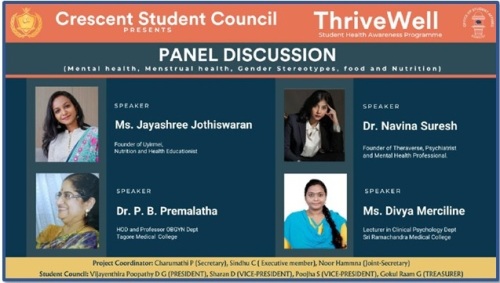
Figure XVII (2.5) – 11 : ThriveWell Student Health Awareness Programme
SDG 17: PARTNERSHIPS FOR THE GOALS – FOSTERING TEAMWORK: THE “TOGETHER WE RISE” ICEBREAKER
Furthermore, the “Together We Rise” icebreaker event aimed to foster connections among new members while emphasising the importance of teamwork and collaboration. This initiative not only strengthened the internal bonds within the club but also prepared members for future collaborative efforts with NGOs and community organisations, reinforcing the club’s commitment to collective action in addressing social issues.
SDG 16: PEACE, JUSTICE AND STRONG INSTITUTIONS – SPREADING AWARENESS: THE “QUOTECON: A QUOTE FEST” PROJECT
The “QuoteCon: A Quote Fest” project exemplified the club’s dedication to spreading knowledge and fostering collaboration among various Rotaract clubs. By encouraging participants to share quotes on social media, the initiative aimed to inspire and engage a wider audience in discussions about social issues, aligning with the SDG of promoting peaceful and inclusive societies.
SDG 17: PARTNERSHIPS FOR THE GOALS – CONCLUSION: A CULTURE OF SOCIAL RESPONSIBILITY AND SUSTAINABLE DEVELOPMENT
In conclusion, the Rotaract Club of Crescent has effectively collaborated with NGOs to tackle the SDGs through various initiatives during the 2022-23 academic year. By engaging in community service projects, educational seminars, and awareness campaigns, the club has contributed to immediate needs and fostered a culture of social responsibility among its members. These efforts reflect the club’s commitment to making a meaningful impact on society and promoting sustainable development in alignment with the SDGs.
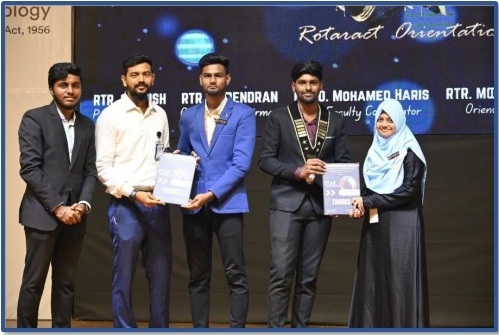
Figure XVII (2.5) – 12 : Rotaract Club of Crescent
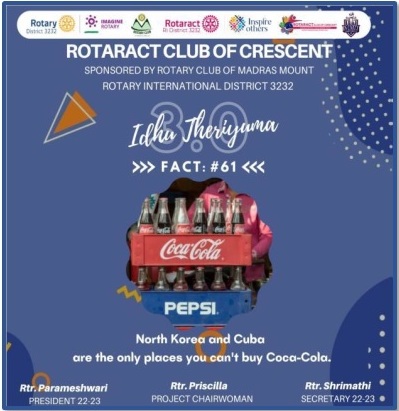
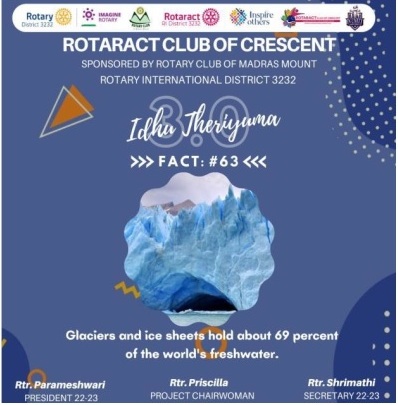
Figure XVII (2.5) – 13 : social media platforms of the Rotaract Club of Crescent.
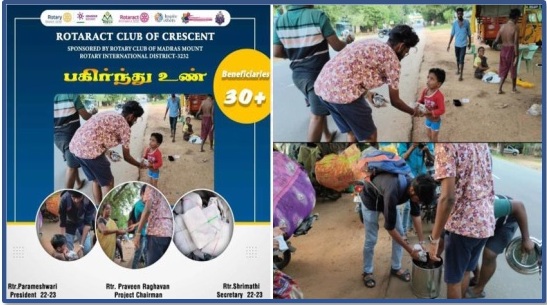
Figure XVII (2.5) – 14 : “Pakirthu Unn” – heartfelt community service project took place at Mannivakkam. Embracing this ethos, the remaining food from the “VILAYADUVOMA”
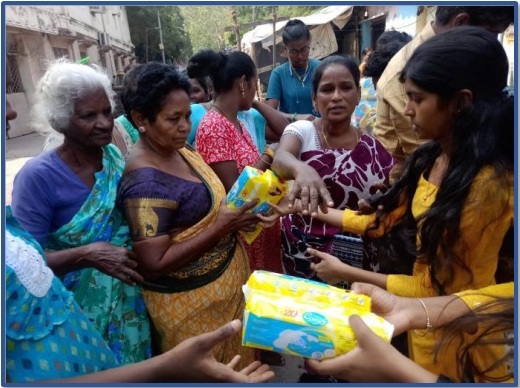
Figure XVII (2.5) – 15 : A meaningful community service project unfolded. It was a napkin donation drive where board members and green rotaractors gathered to distribute napkins to women in the area.
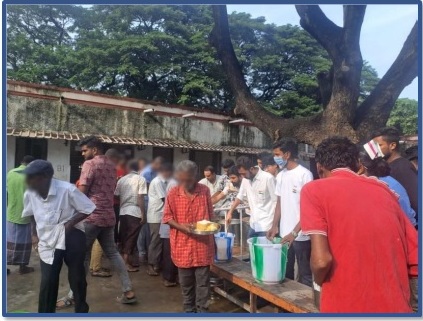
Figure XVII (2.5) – 16 : The Rotaract Club of Crescent fortunately accomplished the food donation project “BUY ONE MORE” on 15th August 2023 at IMS Kilpauk Hospital

Figure XVII (2.5) – 17 : Food Donation Camp Brochure
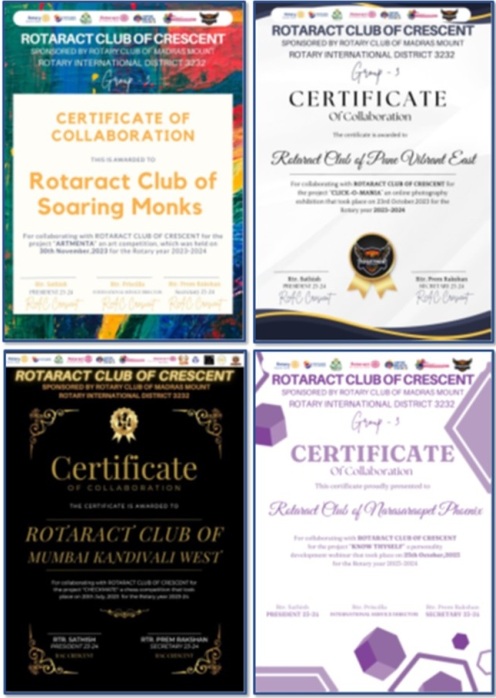
Figure XVII (2.5) – 18 : Certificate of Collaboration – Rotaract Club of Crescent
Policy for Partnerships for the Goals
Issue: 04; Revised on 2023
| Policy Created on | July 2009 |
| 1st Revision amended on | IQAC Meeting held on 27th October 2017 |
| 2nd Revision amended on | IQAC Meeting held on 31st March 2021 |
| 3rd Revision amended on | IQAC Meeting held on 16th June 2023 |
17.1. OBJECTIVE
The primary objective of this policy is to establish and strengthen partnerships among universities, government bodies, NGOs, and the private sector to promote sustainable development through collaborative efforts, knowledge sharing, and resource mobilisation.
17.2 STATEMENT OF POLICY
The following metrics and indicators will guide the implementation of this policy.
- Research into Partnerships for the Goals: Increase the proportion of academic publications co-authored with low or lower-middle-income countries to foster global collaboration.
- Relationships to Support the Goals: Develop mechanisms to gather data on SDG progress and promote best practices through cross-sectoral dialogue.
- Publication of SDG Reports: Institutions must commit to publishing data on their performance against each of the 17 SDGs, ensuring transparency and accountability.
- Education for SDGs: Ensure a commitment to meaningful education around the SDGs across all university programs relevant to all students.
- Collaboration for SDG Best Practices: Engage in international collaboration to review and develop best practices for tackling the SDGs.
17.3 RESPONSIBILITIES
- Establish Collaborative Frameworks:
- Create Memoranda of Understanding (MoUs) with local and international organizations, NGOs, and government agencies to formalise partnerships.
- Engage in joint research initiatives that align with SDGs
- Enhance Sustainability Literacy:
- Integrate sustainability concepts into the curriculum across all disciplines, ensuring that students acquire the necessary knowledge, skills, and values to contribute to sustainable development.
- Implement workshops and training sessions for faculty and students to enhance understanding of the SDGs and their interconnections.
- Promote Cross-Sectoral Dialogue:
- Organize annual conferences and seminars that bring together stakeholders from academia, industry, and government to discuss progress, challenges, and innovative solutions related to the SDGs.
- Facilitate platforms for knowledge exchange, such as webinars and collaborative projects, to share best practices and successful case studies.
- Monitor and Evaluate Partnerships:
- Develop a robust monitoring and evaluation framework to assess the effectiveness of partnerships and their contributions to achieving the SDGs.
- Utilize data collected from partnerships to inform policy decisions and improve collaborative efforts.
17.4 IMPLEMENTATION
- Short-term (1-2 years): Establish partnerships, integrate sustainability literacy into the curriculum, and initiate cross-sectoral dialogues.
- Medium-term (3-5 years): Expand collaborative research projects, publish annual SDG reports, and evaluate the impact of partnerships.
- Long-term (5+ years): Foster a culture of sustainability within the institution and the community, ensuring ongoing commitment to the SDGs.
17.5 DISSEMINATION OF POLICY
. A. Signage and Visual Communication
- Campus Signage:
- Display clear and informative signage throughout the campus highlighting key aspects of the Partnerships for the Goals policy, focusing on sustainability practices.
- Utilize engaging visuals and infographics that effectively capture attention and communicate important messages.
B. Awareness Programs
- Regular Workshops and Seminars:
- Conduct awareness programs at regular intervals, including workshops, seminars, and training sessions to educate the campus community about the importance of partnerships for sustainability.
- Use interactive formats to promote engagement, encourage dialogue, and facilitate knowledge sharing among participants.
- Student and Faculty Involvement:
- Involve students and faculty in planning and executing awareness programs, fostering a sense of ownership and responsibility towards the policy’s implementation.
- Encourage student-led initiatives that promote collaboration and sustainability practices across campus.
C. Digital Communication
- Website Updates:
- Post the Partnerships for the Goals policy on the Institute’s official website, ensuring easy access for all stakeholders.
- Regularly update the webpage with new information regarding events, initiatives, and progress related to the policy.
- Social Media Engagement:
- Utilize social media platforms to raise awareness about the policy, share success stories, and promote upcoming events related to partnerships and sustainability.
- Create engaging content, including videos, infographics, and testimonials, to reach a broader audience and enhance visibility.
D . Key Performance Indicators (KPIs)
- Track the effectiveness of dissemination strategies through metrics.
17.6 ENFORCEMENT OF POLICY
a) The Dean of Schools and Head of the Departments monitor compliance and address breaches.
b) Awareness of the policy among students, staff, and visitors is essential.
c) Breaches may lead to disciplinary action per the Institute’s code of conduct.
REGISTRAR


